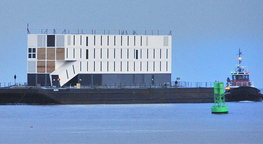Here’s the latest leading theory about those mystery barges in Portland and San Francisco: They’re party boats for launching Google Glass, the Internet giant’s computerized eyewear.
The barges, and the odd-looking structures on top of them, have been linked to Google in documents from the Coast Guard in New London, Conn., and in an apparent slip-of-the-tongue by a Coast Guard official in California.
Speculation about the purpose of the barges had focused largely on Google’s patented plans to build floating data centers, which would use ocean water to cool massive computer servers that store and process data.
But new evidence indicates the barges will be towed to large coastal cities, where wealthy customers will be invited aboard for exclusive looks at Google Glass. The wearable computer, still under development, would enable people to communicate with the Internet via voice commands.
Google has said nothing publicly.
The four-story structures on the barges are built with 40-foot-long shipping containers. Citing multiple anonymous sources, KPIX-TV in San Francisco reported Friday that the structures have interchangeable parts so they can easily be put together and taken down.
They will be showrooms to promote the launch of Google Glass, the station reported, with numerous rooms on the first three floors to highlight various features of the high-tech glasses. An invitation-only party deck will be on each structure’s top floor for upscale customers.
Hoping to upstage the retail efforts of competitors such as Apple, Google plans to haul the showrooms up and down America’s coasts as it promotes the launch of Google Glass, as the theory goes.
In Portland, the barge is berthed at a wharf owned by Pittsfield-based Cianbro Corp., which has been hired to install undisclosed technology in the structure. Company officials aren’t talking about the project.
The structure was built this summer in New London, Conn., by Turner Construction. When that company first leased space at a pier in New London, Coast Guard officials met with project managers from Google, Turner Construction and Cianbro to discuss the project and expectations, according to documents obtained by The Day through a Freedom of Information Act request.
According to the newspaper, Coast Guard Sector Long Island Sound took part in a conference call on July 1 with a naval architect, a marine transportation company and Michael Tierney of Google Glass to review the plans.
The documents reveal a plan to operate the vessel in various ports, the first being New York Harbor, the newspaper reported.
In San Francisco, Google has held talks with officials to dock its barge for a period of time at the Fort Mason Center, part of the Golden Gate National Recreation Area. The barge is now in an industrial area at Treasure Island, a former Navy base in San Francisco Bay.
In Portland, the idea of a floating showroom is being viewed with skepticism – or as an awe-inspiring marketing coup.
Steve DiMillo, whose family has run a floating restaurant on a former car ferry in Portland Harbor since 1988, said it doesn’t make any financial sense to build an expensive floating showroom to sell a product. The structure in Portland is about the size of a four-story building, with more than 20,000 square feet of floor space.
“I would be shocked if this was true,” DiMillo said. “The mystery continues, as far as I am concerned.”
Curtis Picard, executive director of the National Retail Association of Maine, takes the view that the barge is a brilliant marketing ploy and real estate move.
He noted that a new trend in retail is the “pop-up store,” in which a retailer operates for a short time in a trendy shopping district. Pop-up stores let retailers try out new locations at relatively modest cost and risk.
Floating showrooms would also attract a lot of media attention and public interest. “If it’s not true, what a great idea,” Picard said.
Frank O’Connor, commercial real estate broker with the Dunham Group in Portland, said a floating store could save Google money. He noted that Apple is renting store space in Manhattan for $600 a square foot.
Still, a store should be in a hub of activity, not in the water, he said. “If that is a showroom, I don’t understand the thought process.”
But Jennifer Hutchins, executive director of Creative Portland, a nonprofit that aims to build the city’s creative economy, said she loves the idea of a floating showroom.
Even better, she said, are all the national news stories and social media posts that are linking Portland with San Francisco and Google – America’s hippest city and biggest Internet company.
She noted that “The Daily Show with Jon Stewart” showed viewers photos of Portland Harbor and an aerial photo of the Portland peninsula.
Before the “Google Barge” is towed to New York Harbor, she said, she hopes the company will launch its marketing campaign in Portland and open the structure to the public while it’s still in Portland Harbor.
“Google,” she said, “let it stay here for a while.”
Tom Bell can be contacted at 791-6369 or at:
tbell@pressherald.com
Send questions/comments to the editors.



